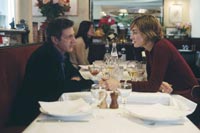Francois Coste (Daniel Auteuil) is a successful man. He’s an art dealer in an art dealer’s dream town: Paris. He has a beautiful daughter, a posh apartment, and all the joys that money can buy. Unfortunately, Francois is without one thing that money can’t buy: true friends. Sure, he has acquaintances; but when asked if he has a best friend—someone he’d feel comfortable calling at 3 a.m.—Francois cannot come up with anything. My Best Friend is a brief, blissful little film about one man’s search for the rarity indicated in the title. It might sound slight or superficially simple, but it’s actually one of the most profound films I’ve seen all year.
The film, directed by Patrice Leconte, kicks off when Francois’s business partner Catherine (Julie Gayet)—who Francois has only ever considered a “business friend”—makes a bet that he won’t be able to come up with a “best friend” by the end of the month. Francois, ashamed and too proud to admit he’s friendless, sets out to track down his heretofore non-existent best friend. His first stop is the bookstore, where he embarrassingly asks the clerk for a copy of How to Make Friends (which is unfortunately all sold out). Fortuitously, he soon meets Bruno (Dany Boon), an exuberant, uber-friendly local cab driver who appears to be the authority on how to make friends.
The film follows this unlikely pair as they comically undertake a crash-course in friend making. Bruno’s curriculum is based on the “three S’s”: Sociable, Smiling, Sincere. It’s hilarious to watch the hapless Francois as he tries to make friends—but mostly just creeps people out. He tracks down his childhood friend and “surprises” him in the supermarket—a scene that almost ends in a restraining order. He goes into a bar and immediately announces “this round’s on me”—a well-meaning, if obviously unfounded offering which effectively clears out the place. Finally, Francois begins to see that Bruno—his affable, ever-helpful sidekick—is the best friend he’s been missing … right under his nose.

Though the film is a comedy and a crowd-pleaser of the best kind, it does not shy away from hinting at deep and complex issues about human interaction, love, and friendship. The thing that plagues Francois (and, as we find out, Bruno too) is the inability to hold and maintain a deep, unconditional relationship with a fellow human. It’s a problem that we all face, to some degree.
Francois is oblivious—at first—to what a real friend is. He thinks that his Rolodex full of appointments, contacts, and phone numbers is evidence of a horde of friends. But “contacts” and “associates” are not best friends. He treats these people as things he can use, but not as souls he can get to know. He knows grievously little about even his own daughter. It reminds me a little of Martin Buber’s book I and Thou, in which Buber describes human relationships as being either I-It or I-Thou. The former is Francois’s method—the utilitarian objectification of others for one’s own fulfillment. Through the course of the film, however, he comes to realize that the latter way—the relationship in which the other is a “Thou,” a sacred soul, more than just a name or a number or something to take advantage of—is a far better way to live.
Bruno has a better grasp of the I-Thou way of relating to others, but he still has a hard time connecting deeply with anyone. As a cabbie by day and trivia-show obsessed fan by night (his childhood hero was Alex Trebek), Bruno lives his simple life cheerfully (“smile and the world smiles with you” is his motto), but he’s nevertheless a lonely, nervous sort of fellow. “Friendship is a myth,” he commiserates to Francois. “Everybody is the same as nobody.”

But this notion—that because we are all so different from one another, we cannot be bonded as friends—is as faulty as Francois’s belief that contacts are the same as friends. On the contrary, as director Leconte so aptly demonstrates in film after film, intimate human connection can occur between the oddest pairings. In his films, such as The Girl on the Bridge (1999), Man on the Train (2002), and Intimate Strangers (2004), Leconte shows how desperate we all are to connect with our fellow man. “We are monads haunted by communion,” wrote George Steiner in Real Presences. We long for that elusive, intimate mutuality between our self and a fellow pilgrim. In Man on the Train, two men from opposite sides of the track (figuratively and literally), as different as two men can be, find a connection that alters each of their lives. And while Friend is not as dark or dramatic as that film, it shares the belief that no two people are so different that they cannot forge a deep and meaningful friendship. Sometimes, as these films remind us, the best pairings are between the most unlikely, but beautifully complimentary, duos.
My Best Friend is a really wonderful, rare film. It is rare because it portrays, in a way that is both persistently funny and unflinchingly earnest, one of the most under-represented but universal human neuroses: the desire for friendship or platonic love. In The Four Loves, C. S. Lewis describes it as philia: the type of “friendship” love that is different than—through just as meaningful and important as—the love between a husband and wife. In romantic love (eros), Lewis writes, two humans look face to face, absorbed in one another. Friends, on the other hand, stand side by side—looking out together, absorbed by some shared interest, or at some beauty or wonder that is best experienced with another person.

It is fitting, then, that the final shot of Friend finds Francois and Bruno standing side by side on a bridge in Paris, looking out over some lovely scene. What each has come to realize is that it is not what one can get out of a friend that makes friendship so great; it’s how much greater life looks when you have another person to share it with.
As Buber writes, “When a culture is no longer centered in a living and continually renewed relational process, it freezes into the It-world which is broken only intermittently by the eruptive, glowing deeds of solitary spirits.”
Films like My Best Friend joyfully remind us of how essential relationships are. They remind us that God created us to be more than “It” objects to populate an isolated world. Instead, he gave us love and friendship as precious means to glimpse—however faintly—what it is to commune with the Holy.
Talk About It
Discussion starters- Can you relate to Francois’s tendency to accumulate many “contacts” and “acquaintances,” rather than forming deep and unconditional relationships?
- At one funny moment in the film, Francois looks up and sees a sign that says “Jesus is your friend,” but finds no comfort there. Why do you think this is such an empty phrase, and how can “Jesus is your friend” be better articulated?
- Much of the film’s focus is on Francois trying to win his bet, but Bruno has a lot at stake as well. What do you think draws Bruno to Francois? And how is his search for a friend different or similar to that of Francois?
The Family Corner
For parents to considerMy Best Friend is rated PG-13 for some strong language, but feels like it could almost be PG. There are a few expletives (in French with English subtitles), but they are fairly infrequent. One female character is revealed to be a lesbian, and there is a scene of her in bed with another woman (fully clothed, sitting up and talking on a telephone). Other than that, the content is pretty clean. It is a very funny and almost effervescent film, keeping the audience smiling throughout. It’s appropriate for many families with older children—if the kids can handle a foreign film with subtitles.
Photos © Copyright IFC Films
Copyright © 2007 Christianity Today. Click for reprint information.











